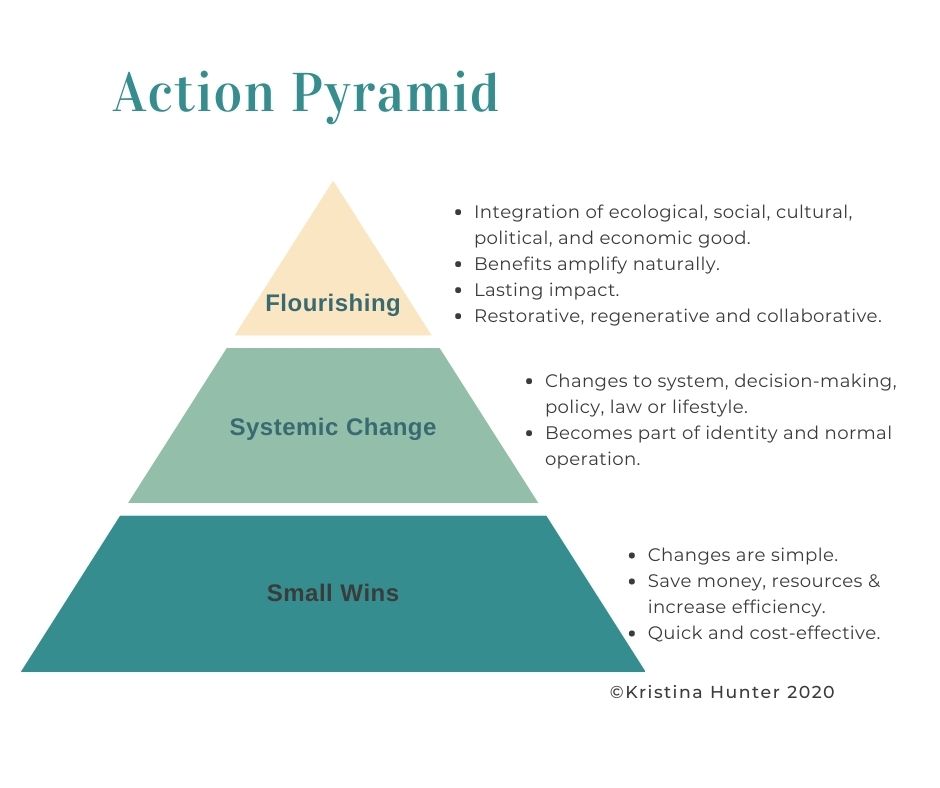The importance of small wins in the action pyramid

Don't get me wrong, I love well-integrated initiatives that create lasting change, but what I see ALL THE TIME are people struggling with knowing what action to take - and that leads to inaction, or too many projects started and nothing finished. Without finishing and realizing the end goal, we deprive ourselves and the world of the benefits of these initiatives.
A time and a place
So, there is a time and a place for well-defined, small concise projects that realize their modest little goals - and get the win! These small wins are actually vital in realizing larger goals. They provide us with momentum, and a sense of accomplishment, individually and collectively. And they can be really useful as demonstration projects that set us up for success when it comes to larger projects.
I like to think of these small wins as being the base of the Action Pyramid. They are at the bottom because there are lots of them, they are easy to achieve, accessible, and they save money and even time and resources. They just make sense and are easy to "sell" as ideas.
These small winds are things like: replacing incandescent light bulbs, reducing food waste, purchasing fewer electronics, and walking rather than driving. They feel good, cost less than the alternative and are easily achieved. Now, what if we could apply this idea not only to environmental sustainability but also to our personal wellbeing? When we integrate the two, this is called Sustainable Wellbeing. Sounds pretty good right? Being able to make an impact for the planet and also improve your personal physical, mental and spiritual wellness.
Now, what if we could apply this idea not only to environmental sustainability but also to our personal wellbeing? When we integrate the two, this is called Sustainable Wellbeing. Sounds pretty good right? Being able to make an impact for the planet and also improve your personal physical, mental and spiritual wellness.
This first tier of the Action Pyramid deals with simple lifestyle changes that allow you to save money, resources and increase efficiency, and we are going to tackle it all from the perspective of Sustainable Wellbeing - environmental sustainability and personal wellness. Here's how...

In order to lead an environmentally and mentally sustainable life, you can begin by addressing and identifying aspects of your life that result in waste production. Waste can be defined as things that are thrown away, not used, or “garbage” with no additional use to you.
Although waste is often thought of in terms of physical items and literal trash, actions, time, habits and even relationships can also be wasteful and therefore contribute to dissatisfaction in your life. Assess and reflect on the aspects in your life that might be considered wasteful or non-beneficial in regard to the environment as well as your mental wellbeing.
Environmental Sustainability

Actions, habits, and items you own may produce waste that has negative effects on the environment and are therefore unsustainable and unnecessary in your life. Consider how the following aspects in your life affect the environment.
- Consumer goods: Consumer goods are products that are bought for consumption. While buying products can sometimes be unavoidable, it is important to be conscious of the waste consumption can produce.
- Take a look at the consumer goods that you buy and use up on a regular basis such as toiletries, cosmetics, groceries, and cleaning supplies. Although these items are often necessities, it is beneficial to determine whether you are using up the entire product before repurchasing, how the ingredients in the product affect the environment, and if the product is encased in wasteful packaging. Make use of EWG’s Skin Deep consumer guide to assess the environmental rating of your personal care products. Take note of any consumer goods that are particularly wasteful or harmful to the environment.
- It is also important to assess your purchasing habits when it comes to consumer goods. Do you find yourself purchasing items that you don’t need or regret later? Do you have a habit of buying items that are trendy but go out of style quickly? Take a look at your last ten non-necessity purchases and identify any wasteful patterns. This environmental shopping quiz can help you determine your shopping habits as well.
- Household clutter: Not only is household clutter visually unappealing, but it is likely that a large portion of the clutter in your house is made up of items that you no longer use. These items end up wasting valuable space and leave your house looking messy and unorganized. Take a look around your house and determine whether the items that you own are contributing meaningfully to your life. Items that do not serve a purpose or bring joy to your life can be considered clutter. You may find it beneficial to assess your house room by room and take note of the items which are immediately visible and do not have a designated “place.” Estimate how many of these items can be considered clutter. Read more about distinguishing between clutter and valuable items as it relates to the KonMari Method™.
- Practices that generate waste: You may be surprised by the amount of waste you generate on a regular basis. Daily, weekly, or monthly habits and practices can significantly increase the amount of waste you produce. Picking up take-out food and drinks, using plastic bags, straws, plastic water bottles, and disposable products such as cotton pads and paper plates are all practices that contribute to waste production in your life. Assess which of your practices, both at-home and on-the-go, result in the production of waste. This plastic-free guide may be useful in helping you identify practices that result in waste.
- Excess space: Waste doesn’t have to be something you can hold or fit into a garbage bin! Areas that are underutilized, whether they are within your home, yard, or in your garage, can be thought of as wasted space. Underutilizing a space may mean that you are using it to store clutter or items that you have forgotten about or use infrequently. Think of a garage filled with odds and ends. Not only is this type of underutilization unsightly, but it is preventing you from using the space for something productive or beneficial. On the other hand, wasted spaces may simply be areas that are too large or serve no purpose. This could include spare bedrooms or dining rooms that are only used once or twice a year. Make use of this article by Green Residential in order to help you identify some problem-areas within your home.
- Vehicles: Vehicles can be a large source of waste in your life. While owning a vehicle is normalized in our society, it isn’t actually necessary for many people’s lifestyles. If you are not using your vehicle frequently, money is being wasted on car insurance and maintenance costs. On the other hand, using a vehicle in situations where it is unnecessary wastes gas and creates pollution. Determine whether you are getting the most possible use out of your vehicle and if there are more suitable transportation options available. Consider whether public transportation, car-sharing, walking, biking, carpooling, or a combination of a few methods could suit your transportation needs instead.
- Appliances that waste energy: There is a significant monetary and environmental cost associated with energy usage in the home. It is important to use energy-efficient appliances in order to reduce the amount of energy that gets wasted on a regular basis. Determining how much energy your appliances consume lets you know how much you are spending on energy and whether it is beneficial to replace your current models with alternatives that are more energy efficient. Use these Energy.gov resources to help you determine the energy consumption and cost of your appliances and electronics.
- Food waste: Food waste is the disposal of food that is, or was at some point, edible. This includes any uneaten portions of food that get scraped into the garbage, as well as food that has spoiled. Food waste should not be confused with the inedible portions of your food, such as peels and stems, which are called food scraps. If you find yourself buying too many groceries at once or shopping without a meal plan in mind, you might find that your groceries go bad before you get a chance to eat them. Similarly, cooking too much food at once may result in the disposal of the leftovers, whether you chose not to save them in the first place or forgot about them for weeks in the back of your fridge. One of the best ways to assess the amount of food waste you produce is by conducting a food waste audit. This will allow you to identify patterns within your food wasting habits and identify the root cause. Make use of these instructions provided by Ends and Stems in order to guide your at-home food waste audit.
- Paper mailings/subscriptions/flyers: As businesses, retailers, and organizations continue to transition to digital platforms, the need for physical advertising has decreased. However, you might find that you are still receiving paper flyers, bills, mailings, and subscriptions. If you have access to a computer, tablet, or smartphone, there is a high likelihood that you can access these services online and reduce the amount of paper you receive and recycle. Check out which of your mailings could be switched to electronic delivery. This is often an option for magazines, newspapers, and bills. Additionally, assess which mailings are no longer useful to you so that you can remove them from your mailing list and cut down on paper waste.
- Unworn clothing: Although clothing can be easy to accumulate and grow out of, it is common to hold onto clothing that no longer serves its purpose. Whether you have difficulty determining if you should get rid of an article of clothing, or simply can’t be bothered to clean out your closet, keeping unused clothing is not ideal. These articles of clothing contribute to household clutter and could better serve someone else. Go through your closet to determine whether you are holding onto clothing that you no longer wear. Ask yourself when was the last time I wore this? When/where can I see myself wearing this again? For a longer-term assessment method, turn your hangers around so they are positioned differently than usual. As you wear an item of clothing, place your hanger back in its regular position. After a period of time you will be able to determine which articles of clothing did not get worn based on the position of the hanger.
Wellbeing Sustainability

Aspects in your life may have negative effects on your wellbeing and are therefore unsustainable, wasteful, and unnecessary in your life. Consider how the following aspects in your life affect your wellbeing.
- Habits: Habits are the things we do without thinking on a regular basis. Habits are often things that we do for short periods of time, multiple times a day. While some habits can be beneficial, others can result in wasted time and energy. Time-wasting habits can take up a large portion of your day, therefore hindering your productivity. Take notice of your daily habits in order to identify which ones are interfering with your time and productivity. Some time-wasting habits may include frequently checking your social media and email, pressing the snooze button on your alarm, procrastinating, and taking unnecessary coffee/bathroom breaks. A great way to document your habits is by keeping an activity log for a short period of time. Consider using Darious Foroux’s three step activity log to help you identify your daily habits.
- Activities: Unlike habits, activities are things that you do intentionally and for a longer period of time. The activities we choose to partake in determine how productive and fulfilling our days are. Consider the ways in which you spend your free time. Do you find that the activities you partake in are not as fulfilling and engaging as they could be? Activities such as watching television and consuming other forms of media, commuting, and shopping, while fine in moderation, can become wasteful if they are taking up large portions of your day. Use the activity log in the “habits” section to assess your daily activities. Instead of focusing on the small habits, look at the larger activities that make up your day. Determine whether these activities are planned or are things you end up doing when you have no schedule. Assess whether these activities could be considered wasteful in your life either due to the nature of the activity or the amount of time this activity consumes in your day.
- Relationships: Although it can be difficult to come to terms with, relationships can weaken over time and lose their value or become a source of negativity in your life. It takes a lot of effort and time to properly maintain relationships, therefore it is important to determine which relationships to focus on and which ones should take a backseat in your life. Assess your relationships in order to determine if they are serving you well and contributing to your wellbeing. This includes considering how much time and energy you put into the relationship and if your efforts are being reciprocated. It also entails determining the benefits and costs associated with the relationship. Make use of Marie Kondo’s advice on what to do when a relationship no longer sparks joy.
- Spending money: Managing your finances is an important part of maintaining a healthy and secure lifestyle. While spending money is inevitable, there are ways to limit unnecessary and wasteful spending. Wasteful spending can occur by making impulse purchases, paying unnecessary fees, failing to look for discounts, or making redundant purchases. Assess your spending habits to determine where you’re spending unnecessary money. You may be surprised by how quickly little things add up. Overlapping media and cable subscriptions, daily coffee runs, and buying takeout on the regular might be costing you more than you think. One of the best ways to assess where your money is going is by tracking your spending. Consider using a detailed spreadsheet, money tracking app, or online banking features that monitor and categorize your expenses. This money tracking spreadsheet template can be used and modified to suit your needs. Instructions on how to use this spreadsheet can be found here.
- Sleep schedule: Getting the right amount of sleep is important in order to make the most out of your day in terms of time and energy. Although it may feel like sleeping can be a waste of time, if you’re not getting the correct amount of sleep, your time spent awake will be wasteful as well due to lack of energy. In order to optimize your time and energy, it is helpful to assess whether you are getting the correct amount of sleep. Because the correct amount of sleep varies from person to person, it is important to use a variety of methods to determine what your ideal amount of sleep is. Make use of this resource from the Division of Sleep Medicine at Harvard Medical School.
- Missed opportunities: When we are not managing our time successfully or prioritizing the wrong things it can be easy to decline offers and opportunities because we feel too busy or tired. If you find yourself making these excuses, you may be wasting a perfectly good opportunity! For example, you might find that if you reduced some of the time you spend watching television, you would actually be able to join that book club you were invited to attend. Write down any activities or opportunities you have rejected in the past that still interest you today. This could include anything from learning to knit, to starting your own business.
- Negative thoughts and emotions: It is important to take care of your own mental health and wellbeing. While it is natural to feel negative thoughts and emotions at times, letting these thoughts overwhelm you can leave you feeling dissatisfied, tired, and anxious, and prevent you from enjoying your life. Luckily, there are ways to reduce the number of negative thoughts and emotions you encounter throughout your day. One of the best coping mechanisms is to try and recognize when your thoughts are distorted and untrue. When you encounter a negative thought, it is beneficial to assess whether this thought is warranted or not. It is not uncommon to fall prey to black-and-white thinking, self-deprecation, and unnecessarily negative thoughts. In being able to identify when your thoughts are distorted, you will be able to challenge them by applying logic and reason. More information on identifying and challenging your negative thoughts can be found in this article by Patricia Harteneck.
Remember, we are not trying to tackle it all right here and now, these are simply some useful ways to get a small quick win for environmental sustainability and personal wellness. Consider these suggestions and challenge yourself to take on just ONE by the end of next weekend. And, any small win, is still a win, so let yourself feel good about your action!
Stay connected with news and updates!
Join my mailing list to receive the latest news and updates. Your information will not be shared.

